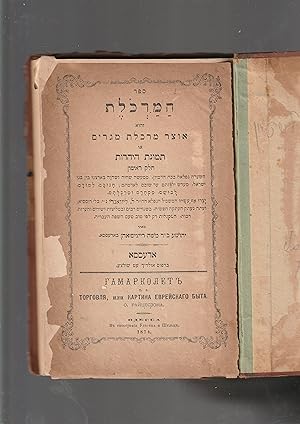About this Item
In Hebrew. VII< 189 pages. 225 x 155 mm. Illustrated. Title page is in Hebrew and Russian and is browned and very fragile. THe leaves are yellowed and a bit fragile. .Lev Osipovich Levanda (1835-1888) was a journalist and fiction writer. Born in Minsk, Lev Levanda studied in a local Jewish school that, in response to governmental pressures, offered secular subjects; the students came from poor families who could not afford traditional education. Levanda went on to a government-sponsored rabbinical school in Vilna and a teaching job in Minsk, where he was also appointed to the government post of Jewish Expert, assisting with programs to study Jewish life and editing state textbooks for Jewish children. Levanda began to write articles and fiction, producing material in the early 1860s for the short-lived Odessa papers Razsvet (Dawn, edited by Osip Rabinovich) and Sion (Zion), and then for liberal Russian newspapers in Saint Petersburg and Vilna. In the 1870s and 1880s, he wrote for the Saint Petersburg Russian Jewish journals Evreiskaia biblioteka (Jewish Library), Russkii evrei (Russian Jew), and Voskhod (Sunrise). As was the case with other Russian Jewish writers of his generation, Levanda divided his efforts between journalism and tendentious fiction. Neither his contemporaries nor later critics admired his style, but his writing testifies strongly to the changes in Russian Jewish life and politics in the empire over his lifetime. Though he has been associated with assimilationism and wrote critically of Jewish traditionalism at the beginning of his career, by its end Levanda had become an advocate of Jewish self-defense during pogroms, a critic of extreme assimilation, and a spokesperson for early Zionism. Levanda?s best work is the novel Goriachee vremia (Seething Times; 1875), a depiction of Jews responding in various ways to the Polish uprising of 1863. Whereas some Jews supported the Polish nationalist cause, Levanda?s hero, Arkady Sarin, argues for loyalty to the Russian tsar, repeating points the author had made in his nonfiction. However, the novel allows for multiple interpretations, as Levanda has other characters strongly articulating different positions, pointing out ties between Jews and Poles and the scanty rewards the Russian Empire had given Jews thus far for their loyalty. Seller Inventory # 016590
Contact seller
Report this item
![]()




